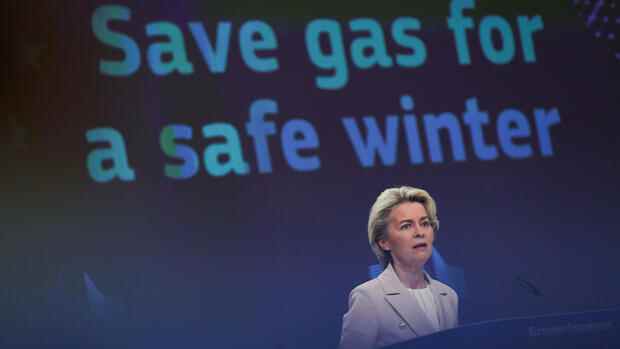The EU Commission President wants to force the EU countries to save gas if necessary.
(Photo: Xinhua/eyevine/laif)
Brussels The resistance of several southern European countries to the EU Commission’s gas emergency plan was apparently successful. Before the special meeting of the 27 energy ministers on Tuesday in Brussels, the controversial proposal had already been significantly watered down.
The latest draft by the Czech Council Presidency, which is available to the Handelsblatt, provides for numerous exceptions for countries that are not connected to the European gas or electricity grid. Critical sectors such as the steel and chemical industries are also to be excluded from the general savings target.
EU Commission President Ursula von der Leyen (CDU) suggested last week that all EU countries should reduce their gas consumption by 15 percent by the end of March – measured against the average consumption of the past five years. In this way, she wants to prepare the member states for a sudden delivery stop from Russia.
By the end of September, the Brussels authorities want to see a national savings plan from every government. If consumption does not fall quickly enough, the Commission wants to make the savings target mandatory.
Top jobs of the day
Find the best jobs now and
be notified by email.
The prospect of coercive measures from Brussels had met with strong resistance in a number of member states. The Spanish government, for example, argued that the Commission’s plan was “unfair” because the country is not dependent on Russian gas and, due to a lack of pipeline connections, cannot transmit gas to ailing member states.
In hours of negotiations, the 27 EU ambassadors in Brussels have now changed the Commission’s proposal in key points. According to the latest draft, all countries that have no significant gas connections to the rest of the EU can apply for an exemption. These are Spain, Portugal, Ireland, Cyprus and Malta. The same applies to the Baltic States, whose power grid is not connected to that of the EU.
Gas supply: National savings plans do not have to be available in the EU until October
Another exception concerns gas that is used for critical industries, flows into gas storage facilities or is exported to other countries. The governments should also have until the end of October, i.e. one month longer, to present their national savings plans to the Commission. According to the draft, the member states had requested that “national particularities” be taken into account when setting binding targets.
In addition, the Commission should no longer have the right to declare a gas emergency on its own and to prescribe the savings target. Instead, this step must be approved by a majority of member states.
>> Also read here: Russia is turning on the gas tap again – these are the numbers that matter now
Amid sweeping changes to the Commission’s proposal, diplomats warned on Monday that the plan would be watered down to the point where it would lose all effectiveness. According to the Commission, a Europe-wide reduction in gas consumption by 15 percent is necessary in order to get through the winter without major damage in the event of a Russian supply freeze.
The differences of opinion are so great that tough discussions are expected at the ministerial meeting on Tuesday. A qualified majority of at least 15 countries is required, which together represent 65 percent of the EU population. The Czech Presidency expressed confidence on Monday that an agreement could be reached.
Spain’s Environment Minister: We didn’t live beyond our means
When the emergency plan was presented, Von der Leyen appealed to the solidarity of Europeans. You have to save gas together and direct excess supplies to the EU countries where it is most urgently needed, she demanded. Federal Environment Minister Robert Habeck (Greens) made a similar statement. The Spanish Environment Minister Teresa Ribera, on the other hand, had thundered: “Unlike other countries, the Spaniards have not lived beyond their means when it comes to energy.”
>> Also read here: Europe in gas trouble: What are other EU countries doing to counter rising prices and supply risks?
In some other countries, the commission plan is seen as “Lex Germany” because that country would need the most gas in the event of a Russian supply freeze.
In the draft resolution, the energy ministers at least agree with the Commission’s assessment of the situation and advocate a joint approach. There is a risk that Russian gas supplies will “suddenly” stop in the near future, the paper says.
The Union must be prepared for this. “In view of the market distortions that are likely if member states react in an uncoordinated manner to a supply disruption from Russia, it is crucial that all member states reduce their gas consumption in solidarity.” However, the draft makes no mention of the 15 percent.
More: EU Commission wants to force member states to save gas
